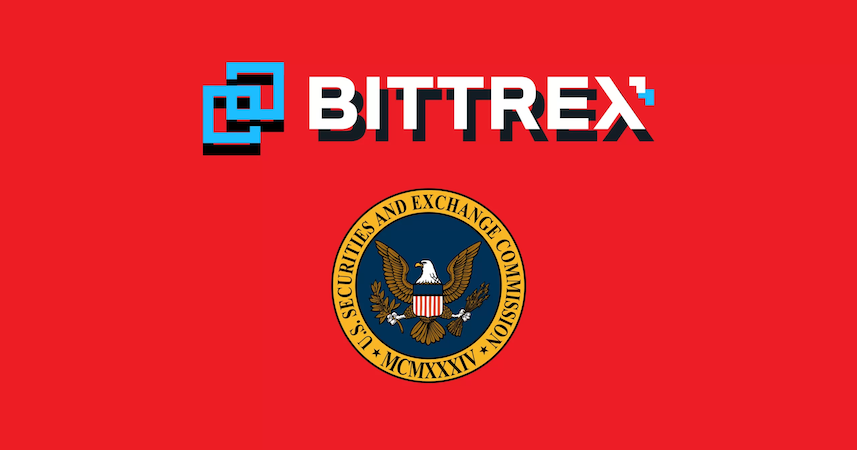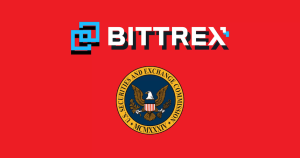Join Our Telegram channel to stay up to date on breaking news coverage
The largest platform in the nation for trading digital assets was originally Bittrex Inc. With a regulatory threat and a determination to permanently exit the United States, it turns out that its turbulent domestic existence is drawing to an end.
According to David Maria, Bittrex’s general counsel, the Securities and Exchange Commission (SEC)’s enforcement staff informed Bittrex in March of this year that it would suggest the agency file a lawsuit against the business for suspected violations of investor-protection laws.
When Seattle-based Bittrex received the notice, it was already prepared to close its U.S. operations, according to Maria, who cited the challenge of collaborating with American regulators who had brought enforcement actions against more than 100 cryptocurrency defendants in the past six years.
Bittrex’s Early Beginnings and Vision
Founded in 2014 by Bill Shihara, Richie Lai, and Rami Kawach, Bittrex emerged as a key player in the rapidly evolving world of cryptocurrency exchanges. Built on the collective experience of its founders, Bittrex aimed to address the prevalent issues of security, stability, and scalability that plagued early cryptocurrency exchanges. With backgrounds in security engineering at major tech companies like Microsoft, Amazon, and BlackBerry, the founding team’s expertise set the stage for Bittrex’s meteoric rise.
Bittrex’s unwavering commitment to security and regulatory compliance set it apart from its competitors. The exchange implemented industry-leading security measures, such as two-factor authentication (2FA), mandatory wallet encryption, and regular third-party audits. Bittrex also adhered to strict KYC (Know Your Customer) and AML (Anti-Money Laundering) policies, ensuring a trustworthy and transparent platform. These efforts helped build a strong reputation for Bittrex as a reliable and secure exchange in the crypto space.
The verdict highlights how regulators are pursuing cryptocurrency exchanges, even those that set regulatory compliance as their focus, such as Coinbase. Many believe that this strong regulatory enforcement is actually a persecution of cryptocurrency, due to its perceived threat to the established financial system, and could have the undesired effect of pushing most of the industry overseas.
SEC Chair Gary Gensler has played a particularly central role in the latest attacks on crypto businesses, in what some have termed “Operation ChokePoint 2.0“. Gensler claims that most crypto businesses have ignored the regulations his organization enacts to safeguard investors. He has advocated for the registration of exchanges like Bittrex with the SEC, which would include the dismantling of their operations, the elimination of conflicts of interest, and a transformation into more conventional stock exchanges. However, these cryptocurrency exchanges contend that the digital assets they list aren’t securities, and as a result, they have opposed the SEC’s request that they be placed under its regulation.
SEC’s antiquated and misguided tactics
The SEC generally advises the industry to use a legal test established by a 1946 Supreme Court case that dealt with an investment in orange orchards instead of telling crypto exchanges up front which digital assets are securities. According to representatives in the industry, the SEC has opted to focus on scoring points through enforcement actions rather than offering advice that would put them on the correct track.
This has been recently criticized even from within the SEC organization itself. As we have reported recently, SEC Commissioner Hester Peirce filed a forceful dissent against Gensler’s most recent policy decision, which expands the statutory definition of a securities exchange to include cryptocurrency and digital asset exchanges, on Friday.
Pierce said that the SEC’s release “undermines fundamental First Amendment protections.” and condemned the actions led by Gensler, saying that,
Rather than embracing the promise of new technology as we have done in the past, here we propose to embrace stagnation, force centralization, urge expatriation, and welcome extinction of new technology.
Other Clashes with Regulators
Unsurprisingly, this is not the first time Bittrex’s rapid growth has been marred by clashes with regulators.
Since 2017, SEC launched thorough investigation into the cryptocurrency sector, which was still at that point considered to be a new area. Bittrex was one of the businesses under scrutiny since that time. Over the years, the government has served Bittrex with a number of subpoenas, primarily to learn how it operates and choose which assets to list.
In 2018, the exchange faced scrutiny from the New York State Department of Financial Services (NYDFS) for alleged deficiencies in its AML and KYC processes. Bittrex ultimately lost its bid for a BitLicense in 2019, forcing it to cease operations in New York. Despite these setbacks, Bittrex continued to evolve and enhance its platform, addressing the concerns raised by regulators.
Wells Notice for Operating without Registering as an Exchange
According to David Maria, SEC prosecutors claimed in their notice of a prospective enforcement action, or “Wells notice,” that Bittrex had broken the law by operating without first registering as an exchange, broker-dealer, or clearinghouse. According to U.S. law, organizations that sell securities to investors are generally required to register with the SEC, abide by regulations meant to protect investors’ money, and disclose fees and risks.
Any legal action against Bittrex would require the commissioners of the SEC’s to cast votes of approval on the motion, which could take as long as six months after the issuance of a Wells notice. However, settlements are very much possible. After issuing a Wells notice, the SEC’s enforcement division may decide to end an investigation if a settlement is reached.
Late last year, Bittrex spoke with SEC staff members about how it may register its business, according to David Maria. It discovered that route couldn’t be taken without virtually stopping all of its revenue-generating operations in the US, he said.
According to David Maria,
The lack of regulatory clarity here results in significant costs and lack of certainty as to what can and cannot be offered.
Bittrex’s Decision to Close All U.S. Operations
This is most likely the reason why Bittrex has decided it will rather close all of its US operations, as its email to its customers indicates. The emails starts with:
After long and painful deliberation, Bill, Rami, and I have taken the decision to voluntarily cease operations in the United States and put our energy and passion for crypto into making Bittrex Global a success. You can read our full statement here.
Since the business is closing its U.S. operations, Bittrex is unsure whether the SEC will bring a lawsuit. Maria stated that SEC would sue if the agency decided to take enforcement action unless regulators “came with a reasonable settlement offer.”
In addition to other legal issues, Bittrex also paid a $29 million fine in 2021 for its early inability to abide by American anti-money-laundering and sanctions legislation. A division of the Treasury Department claimed that from 2014 to 2018, Bittrex’s mechanism for keeping track of suspicious activities, such as trades made by companies in Iran and Syria, was ineffective.
Bill Shihara, Richie Lai, and Rami Kawach, software professionals who had previously worked for Microsoft and Amazon, created Bittrex in 2014. According to a December 2017 opinion piece by former executives Kiran Raj and John Roth published in The Wall Street Journal, it was previously the biggest U.S.-based cryptocurrency exchange by trading volume. Despite being later superseded by American exchanges like Coinbase Global Inc. and Kraken as well as international platforms like Binance, Bittrex continued to play a major role, having millions of customers.
By adding new digital assets to its platform, Bittrex quickly expanded despite the possibility that regulators may view these products as securities that were illegally generated. According to the terms of its settlement with Treasury’s Financial Crimes Enforcement Network, or FinCEN, it eventually managed more than 250 different digital assets.
Bittrex’s decline actually started around the end of 2017 when, following an agreement with FinCEN, the exchange decided to temporarily cease taking on new users to better adhere to anti-money-laundering rules. The interruption occurred at a bad time, as 2017 was a bullish year in which the price of bitcoin increased almost 20-fold with new entrants flooding into the cryptocurrency market.
The legal troubles then continued.
After Bittrex was fined $53 million for “apparent violations” of several U.S. sanctions programs last year, this most recent SEC inquiry simply serves to further inflict harm.
From March 2014 to December 2017, the exchange allegedly disregarded questionable cryptocurrency transactions from individuals in Cuba, Iran, Sudan, Syria, and the Crimea region of Ukraine, allowing them to transfer approximately $263 million.
The exchange apparently had “significant exposure to illicit finance” as a result of Bittrex’s inadequate anti-money laundering policy, which was another reason the SEC punished the exchange.
Related
- U.S. Congress to Address SEC Oversight and Legislation Regarding Stablecoins
- Coinbase and the SEC
- The U.S. Crypto Crackdown May Restructure the Sector
- Operation Choke Point 2.0: US goes after crypto amid confusion and uncertainty
Join Our Telegram channel to stay up to date on breaking news coverage


